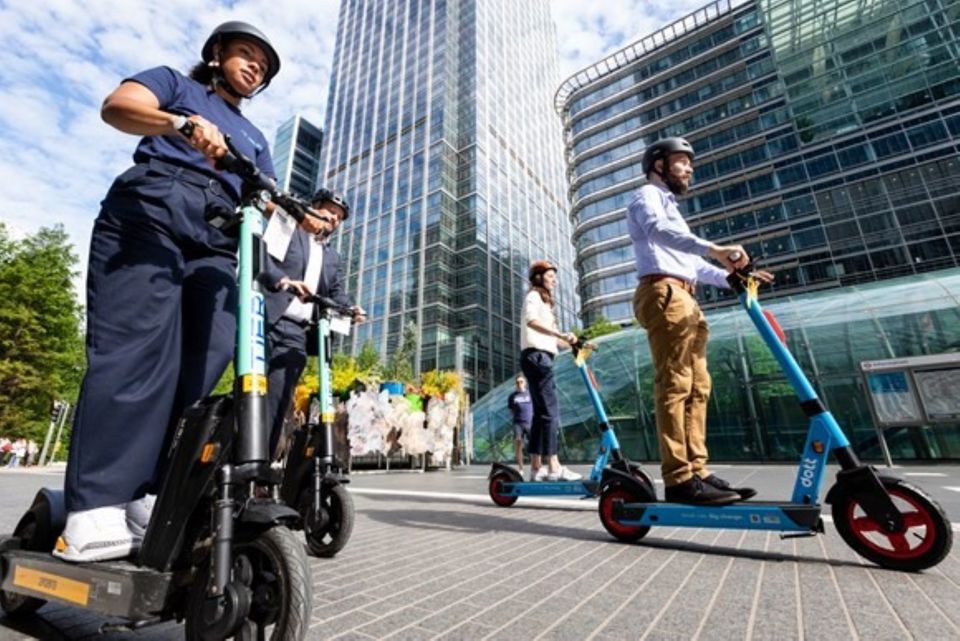The Government wants to introduce legislation around the use of e-scooters, saying they have been left unregulated for too long.
Transport secretary Louise Haigh, however, told MPs on the Transport Committee, that any new rules will not be introduced in this parliament.
“We’ve not got parliamentary time in this session or a relevant bill that could be used to regulate e-scooters, but we will look to legislate,” she said. “It is clearly required.”
She added: “It’s not good enough that it’s been left in this situation for too long.”
The previous Conservative government committed to legalise e-scooters in 2022, but since then progress has stalled.
A series of trials of shared e-scooters in England have been repeatedly extended.
Figures gathered by Collaborative Mobility UK (CoMoUK) show that the trials have been highly successful, with millions of users taking nearly 48 million trips since they began in July 2020.
However, safety concerns have been raised about their use, with accident data published by the Department for Transport (DfT) in September, last year, showing a rise in fatalities.
There were 1,402 collisions involving e-scooters in 2022, compared to 1,352 the previous year.
There were also 12 deaths in collisions involving e-scooters, 11 of whom were e-scooter riders, compared to 10 in 2021.
DfT says its best estimate, after adjusting for changes in reporting by police, is that there were 440 seriously injured and 1,040 slightly injured in collisions involving e-scooters, this compares to 418 and 1,006 respectively in 2021.
However, research from CoMoUK, the UK’s national charity for shared transport, suggests that serious safety incidents are rare, with only one accident for every 500,000 trips.
Haigh says that there has been a lot of interest from local authorities wanting to run more e-scooter trails and that they can play a “really effective” part in an integrated transport strategy.
“It does allow people with accessibility needs to travel easier, but there are undoubtably issues… and I think we need to really carefully analyse what journeys they are replacing and the behavioural impact of e-scooters,” she added.
“We'll make sure in the second round of trials that we are properly evaluating and considering all of that.”
CoMoUK welcomed Haigh’s comments that recognise the role e-scooters can play in an integrated transport strategy, and that the Government intends to legislate on e-scooters when it can find parliamentary time.
Richard Dilks, chief executive of CoMoUK, said: “The transport secretary’s acceptance that it is time to move towards the legalisation of e-scooters is excellent news and we look forward to her announcing the next steps.
“Legalisation is the only way to grow and lock in the impressive popularity of the shared e-scooter trials for the long term, as well as being the only way to have a clear and safe definition of private e-scooters and their use.
“In this way, ministers can give this cheap, flexible and green mode of transport a long-term future, helping deliver growth and decarbonisation at the same time.
“We know we have to attract people away from the use of private cars, and e-scooters are one mode of transport that can help to do this, ideally a part of an integrated, sustainable transport offer.”
A new report published today by the European Transport Safety Council (ETSC) calls for the development of mandatory technical requirements for all e-scooters sold in the European Union to replace the current patchwork of national requirements, and voluntary standards.
The standards should include a speed limiter set at 20km per hour (12.4mph) as well as stability, minimum braking and maximum acceleration requirements, according to ETSC.
The researchers recommend that national governments set a minimum age of 16 for e-scooter riders, a requirement for mandatory helmets, as well as a ban on riding after consuming alcohol or drugs or riding with passengers.
In national data from European countries, the researchers found 119 road deaths in 2022 in collisions involving ‘motorised micro-mobility devices’ – a category of personal light electric vehicle that is dominated by e-scooters but also includes rarer vehicles such as electric unicycles.
While this figure was an increase on previous years, that may be due simply to increased numbers of e-scooter riders.
The researchers are calling for more data on e-scooter usage to understand better the risk levels, which, according to some previous analyses, are higher than for cycling.
Some existing EU product regulations apply to e-scooters, for example rules covering machinery and batteries, however there is no mandatory single standard for e-scooters covering factors such as stability, maximum speed and braking performance.
Ben Pepper, senior associate in the personal injury claims team at Bolt Burdon Kemp, says that Government plans to legislate around the use of privately owned e-scooters is a welcome development.
He explained: “Since their surge in popularity, there has been widespread confusion over their legal status and where they can be used. This has left riders and pedestrians at risk and unprepared for safe interaction on the roads.
“Legalisation, if done correctly, provides an opportunity to address these issues with clear regulations. To be effective, these regulations must incorporate strong safety measures and design standards.
“Public education on proper usage must also be addressed, along with strict enforcement and penalties for those who flout the new rules.
“Crucially, victims of collisions involving e-scooters must have an accessible route to obtaining compensation for their injuries and losses. A comprehensive approach will help mitigate risks and establish a safer environment for riders, pedestrians, and other road users alike.”
To discover how to create a sustainable mobility strategy, read our Fleet Leadership special report.





















Login to comment
Comments
No comments have been made yet.